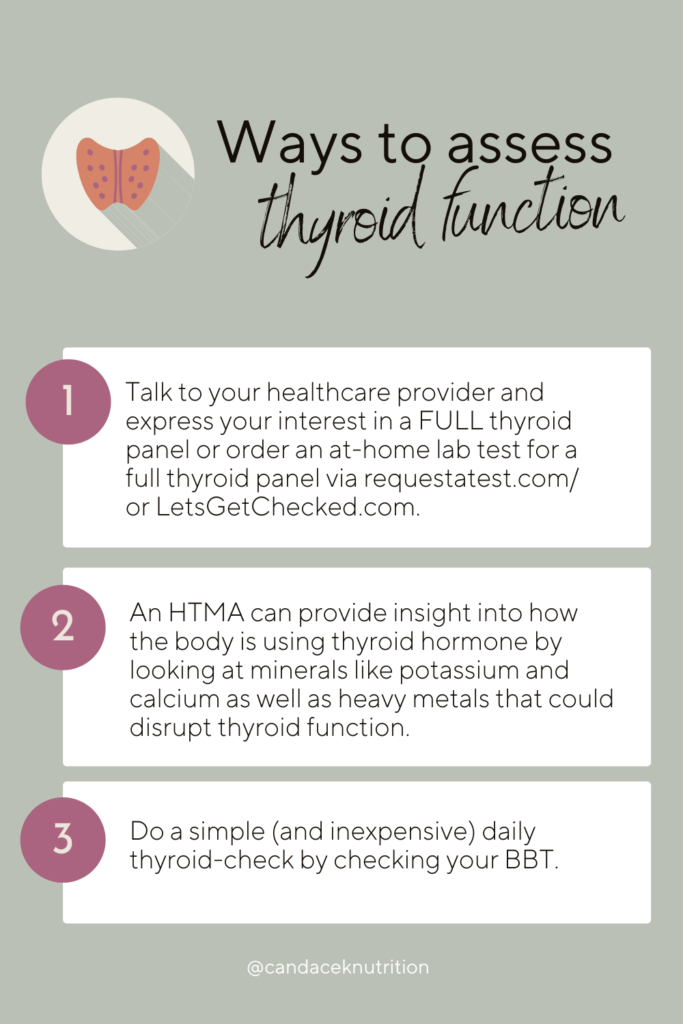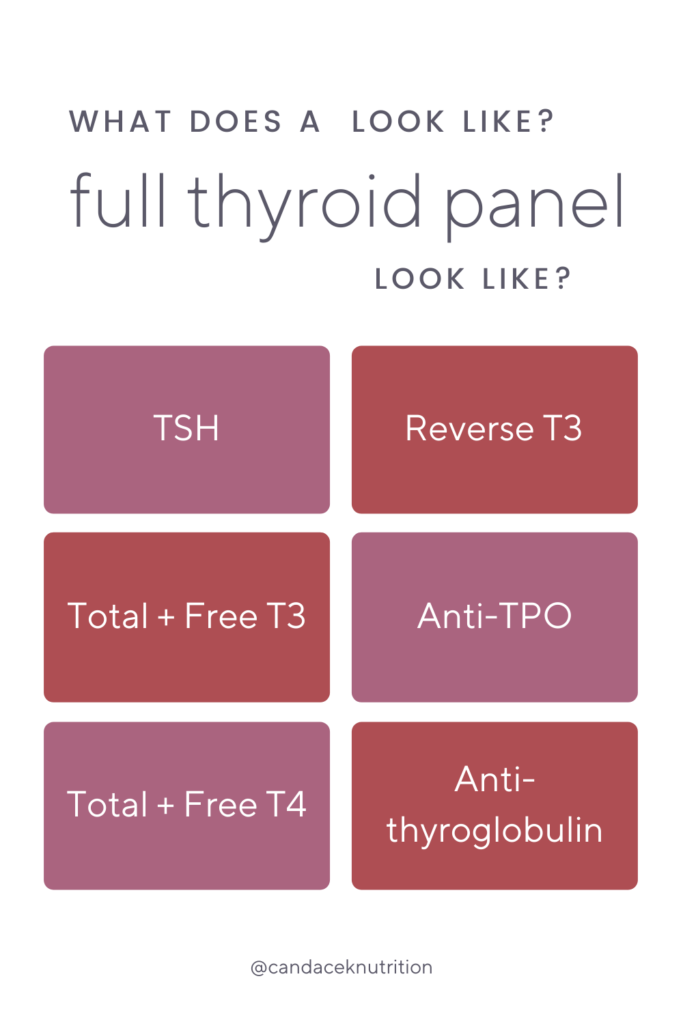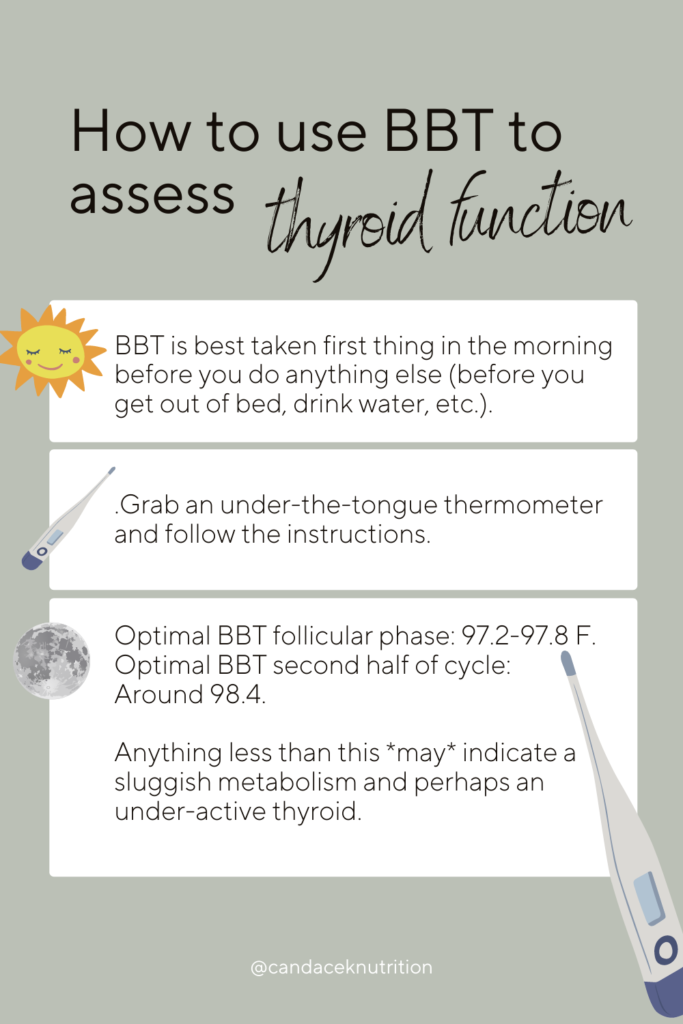Is your thyroid under-performing? Your thyroid is intricately connected to your metabolism so when thyroid health isn’t optimal, your energy and metabolism will start to suffer.
Signs your thyroid is working optimally include feeling warm and energized, sleeping well, shiny hair and great digestion. However, often the thyroid can start “acting up” due to excessive stress, lack of nutrients, a long-term keto diet, excessive fasting, and a multitude of other factors that put stress on your body. This can result in a number of thyroid issues including hyperthyroidism, hypothyroidism, Hashimoto’s, and Grave’s.
Today we’re mostly focusing on hypothyroidism.
Signs and symptoms of hypothyroidism:
In the case of hypothyroid, thyroid function has slowed down and the thyroid is no longer producing enough thyroid hormone, leading to a decrease in thyroid activity. Some signs and symptoms your thyroid might be underperforming are:
- Difficulty losing weight
- Hair loss
- Dry skin
- Loss of outer 1/3 of eyebrow
- Muscle aches, joint pain
- Insomnia
- Always feeling cold/cold hands and feet
- Longer, heavier menstrual cycles
- Slowed heart rate
- Fatigue and waking up very tired
Some causes of a low-functioning thyroid are:
- Chronic stress
- Excessive exercise
- Nutrient deficiencies
- Parasites or gut infections (GI endotoxins can impair the conversion of T4 to T3 by liver tissues)
- Autoimmune conditions
- Excessive exposure to chemicals (including chemicals in skin care and household products)
You have to look at the full picture
It’s important to note that even though you might experience some or all of these “symptoms’ of hypothyroidism, it may not actually be your thyroid (or the thyroid is just part of the picture), but rather you may not be eating to balance basic metabolic needs or keeping your blood sugar stable enough. Either way, it’s worth investigating if you’re experiencing these issues regularly.
There are so many things that can interfere with optimal thyroid function. It’s important to be informed and in many cases, get tested. Keep an eye out for more information on thyroid testing and which markers are the most important (spoiler alert: it’s not TSH!)
Three ways to get more information about your thyroid health
- Talk to your doctor and express your interest in a FULL thyroid panel or request a full thyroid panel to do at home via LetsGetChecked.
- An HTMA can give you valuable insight into how well your body is responding to thyroid hormones and if you have the minerals needed for thyroid hormone sensitivity. Contact me if you’re interested in learning more about this tool.
- Do a simple (and cheap) daily thyroid-check by checking your BBT (see below!).
TSH is not enough
TSH is often the only lab test run when it comes to checking your thyroid health. While this lab marker is important to consider, it doesn’t give a complete picture of what’s actually going on with thyroid function. TSH is actually secreted by the pituitary and this measurement alone is not showing us how the thyroid is responding to the pituitary’s signals. It also doesn’t show us if the body is converting T4 to the active form, T3, or if the body is using thyroid hormone well.
That’s why it’s important to get a FULL Thyroid Panel and not just look at TSH alone. A full thyroid panel includes TSH, but it also includes other markers too, like Free T3, Free T4, reverse T3, and markers for thyroid antibodies.
What does a FULL Thyroid Panel look like?
Let’s take a look at what each of these markers is and their significance.
✅ TSH: Thyroid Stimulating Hormone (TSH) is actually a hormone secreted by the pituitary gland. It tells the thyroid what to do and how much T4 to produce. If TSH is high, it can mean that your body is having to “shout louder” to get your thyroid to work.
✅ Total and Free T3/ Total and Free T4: These are the available levels of thyroid hormones circulating in your blood. T4 is the primary thyroid hormone secreted by the thyroid gland. Most of T4 has to be converted to the more active form, T3. While Total T3 will tell you how much thyroid hormone is in the body, it’s not useful to you unless you can put it to use. Free T3 tells you how much you have available to use.
Free T3 is usually left out of conventional thyroid testing, but it’s so important to know how it’s doing because it does so much.
✅ Reverse T3: This is an inactive form of T3 that can block the action of Free T3. Reverse T3 is a protective mechanism that our body uses to slow down the metabolism and elevates in times of stress, illness, calorie restriction, and insulin resistance.
✅ Thyroid Peroxidase Antibodies/Thyroglobulin Antibodies (TPO/TG Antibodies): These antibodies are useful when it comes to determining if thyroid issues are driven by immune system problems, such as Hashimoto’s.
Even with a full thyroid panel, it’s important to note that you could have completely “normal” levels on your bloodwork, even within functional ranges. BUT, if you’re still having symptoms of thyroid issues and/or your HTMA shows us you’re not using thyroid hormones well, this shouldn’t be ignored and is also a sign of thyroid dysfunction.
That’s why it’s important to look at the complete picture, not just blood work, and certainly not just one blood marker, like TSH.
What an HTMA can tell you about Thyroid Health:
An HTMA is a Hair Tissue Mineral Analysis Test that can provide insight into how well the body is using thyroid hormone by looking at minerals like potassium and calcium, as well as heavy metals that can interfere with thyroid function.
An HTMA is great at helping us see if there is a low cellular response to thyroid hormone. Your thyroid levels could all be great and normal, but if the cells aren’t taking in thyroid hormone and able to use it properly, that can still lead to issues related to thyroid function.
The Thyroid Ratio
There are more obvious minerals to look at when assessing thyroid health, including calcium and potassium, which make up the “Thyroid Ratio” of CA:K. High levels of calcium can bind to thyroid hormone receptors, making it difficult or blocking cells from taking in thyroid hormone. Meanwhile, potassium helps to sensitize the cell to thyroid hormone. Having these two minerals in optimal balance can make a huge difference when it comes to the health of your metabolism.
Other thyroid insights from an HTMA
An HTMA is one of my favorite tools for assessing stress in the body. Stress has a huge impact on thyroid function as it disrupts the autonomic nervous system. The thyroid plays a very important role in this system.
An HTMA will also tell you if mineral status is affecting thyroid health and function. The thyroid needs specific nutrients in the right ratios to produce and convert thyroid hormone. These minerals include copper, zinc, iodine, selenium, magnesium, boron, manganese, chromium and so much more. Knowing where these minerals are at in relation to one another can help us develop a specific plan of action to bring minerals back into balance for optimal thyroid function.
And finally, an HTMA gives us a peak at heavy metal levels in the body that can interfere with thyroid function including mercury and iodine antagonists.
How to use your body temperature to assess thyroid health
You may already be familiar with BBT (basal body temperature) if you have or are trying to conceive. While BBT is a useful tool in tracking our cycles and ovulation, it is also incredibly helpful when assessing metabolic and thyroid function.
There’s a reason why people with hypothyroidism often feel cold all the time or often have cold hands and feet. The thyroid has a direct impact on the way body heat is generated and maintained.
A higher body temperature is usually a result of a higher metabolic rate, and since we know metabolic rate and thyroid function are intricately tied (see previous thyroid and metabolism posts), taking your temperature can provide valuable insight into thyroid function.
What is BBT?
BBT is your body temperature at rest, usually the lowest body temp you will experience throughout the day.
How do you measure BBT?
- BBT is best taken first thing in the morning before you do anything else (before you get out of bed, drink water, etc.).
- Grab an under-the-tongue thermometer and follow the instructions.
- A great BBT would be about 97.8 to 98.2 F. Anything less than this *may* indicate a sluggish metabolism and perhaps an under-active thyroid.
- For women, taking your BBT for about 10 consecutive days during the first half of your cycle will be more accurate as ovulation tends to increase BBT.
- If you consistently have a low BBT, you may want to look into additional testing and stay focused including thyroid-supportive nutrients and lifestyle practices.
What kind of thermometer should I use?
Any under-the-tongue drugstore thermometer will likely work just fine. I have a $10 one that I got off amazon.
These aren’t as accurate as the old mercury thermometers but they are much faster and more convenient, so you may want to repeat the process a few times to get the most accurate reading.
*It’s important to note that while this is a useful tool, it is not perfect. Many things can affect your body temperature including alcohol consumption, a cold/sickness, cold/warm weather, and ovulation.
This is a great tool to add to your toolbox and a cheap “biohack” to track data on a very important biological marker.
How to support your thyroid
Some of the best ways to get started in supporting your thyroid include:
- Eat the right foods, and eat often. Focus on nutrients from food first. The thyroid needs selenium, zinc, magnesium, iodine and copper to function optimally. Getting these nutrients from food is ideal to keep other vitamins and minerals in balance.
- Plenty of high-quality animal protein , collagen, gelatin, fruits, well-cooked root vegetables, honey, daily raw carrot salads, beef liver, oysters and raw dairy are all very pro-thyroid and rich in thyroid-supporting nutrients.
- Reduce/avoid PUFA intake from vegetable/seed oils. Polyunsaturated fats slow down the metabolism and put extra stress on your thyroid. High-PUFA fats include sunflower oil, safflower oil, vegetable oil, corn oil, soybean oil, canola oil, grapeseed oil, rice bran oil, and almond oil. Nuts, seeds, grains, and legumes also have high amounts of PUFAs.
- Eat the right kinds of fats. Saturated fats are pro-metabolism and help increase the metabolic rate and are protective against the oxidation that comes from PUFAs. Eggs, ghee, butter, coconut oil, bison, lamb, beef, and dairy are all great sources of saturated fat.
- Reduce your stress. Stress is one of the most harmful things for your thyroid and your overall health. Find ways to reduce stress, whether that’s meditation, going for a walk, yoga, spending time in sunshine ☀️.
Looking for tips to improve thyroid health and metabolism? You may want to check out my post, “The Thyroid-Metabolism Connection – And How to Support Both.”
Takeaways
Your thyroid is the master of metabolism and dictates how energized you feel throughout the day, how well you sleep, your body temperature, and so much more. Knowing that your thyroid is working optimally and your cells are able to use and take in thyroid hormone is crucial to overall health and longevity. If you suspect you might have sluggish thyroid and/or are experiencing any of the symptoms above, doing a deep dive into thyroid health with blood work, an HTMA, and tracking your BBT can be a great first step in bringing things back into balance.
What questions do you have about thyroid health and function?




